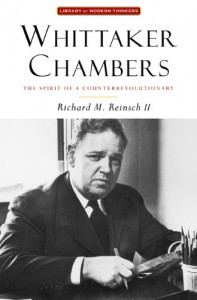If you have been a regular reader of this blog, you can’t have escaped noticing that two of my academic interests are Ronald Reagan and Whittaker Chambers. I have worked for a number of years on a book comparing the two; the manuscript is finished now, and I’m in the process of trying to find a publisher.
That may be a backward way of writing a book, but I never knew when or if I would actually have time to complete it, so I didn’t actively seek a publisher ahead of time; I decided to wait until I was done, then trust that God would open a door. For those of you who pray, this is a formal request for any prayers you might want to offer.
The goal of the book is to compare Reagan’s sometimes overwhelming optimism concerning the future of freedom in both America and the world with Chambers’s equally dominant pessimism on that topic. I found it a fascinating study, in which I read every scrap of writing by and about Chambers that I could find; for Reagan, I not only read nearly every book available on his life and beliefs, but I took notes on every speech he made as president. It was a labor of love.
Until that book is published, if you are interested in reading some of that research, I did have portions of three chapters published in an online journal called First Principles. One covers Reagan’s stylistic debt to FDR [if not his policies], a second delves into the university education Chambers received at Columbia, where he entered a budding Christian conservative and emerged a communist, and the final one deals with the optimism-pessimism comparison. You can find those in my listing of articles—click “My Articles” either at the top of this page or in the sidebar.
 Meanwhile, may I suggest another book that might whet your appetite about Chambers? I recommend Whittaker Chambers: The Spirit of a Counterrevolutionary by Richard Reinsch II. I wrote a review of the book in a journal, but it is by subscription only. Others, though, mirror my views on its value. As George Nash, the preeminent historian of conservatism, has stated,
Meanwhile, may I suggest another book that might whet your appetite about Chambers? I recommend Whittaker Chambers: The Spirit of a Counterrevolutionary by Richard Reinsch II. I wrote a review of the book in a journal, but it is by subscription only. Others, though, mirror my views on its value. As George Nash, the preeminent historian of conservatism, has stated,
Richard Reinsch has written an elegant and discerning study of one of the literary giants of modern conservatism. At a time when the American Right is striving to recover its intellectual bearings, the profoundly spiritual perspective of Whittaker Chambers is worth pondering anew. Reinsch’s timely volume brings Chambers’s thought into arresting focus.
So, get a copy of Mr. Reinsch’s book, then move on to mine when it finally sees the light of day. His is definitely worthwhile; we’ll have to wait a while to see if mine measures up.
